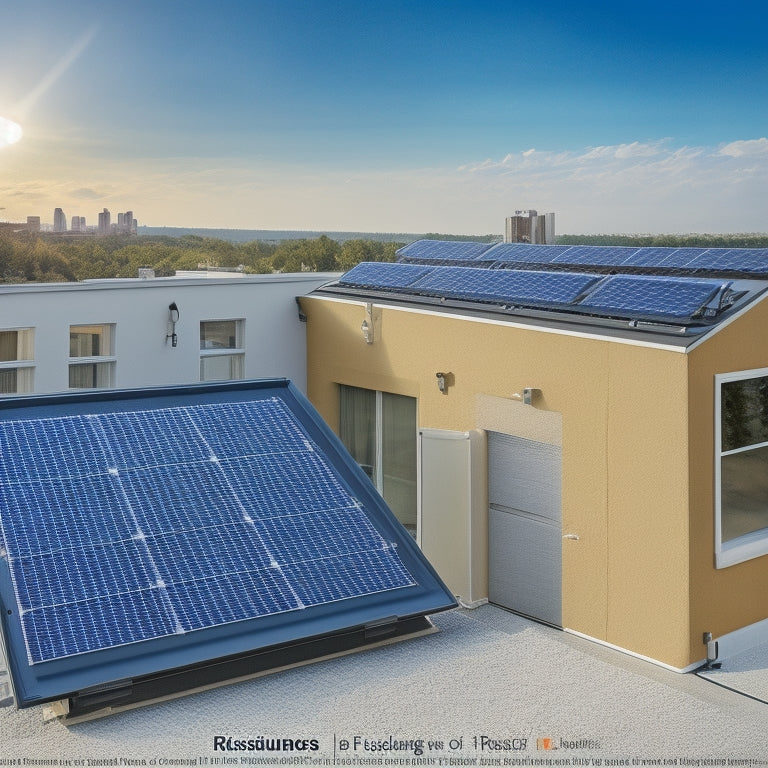
Top-Rated Online Home Solar Panel Providers Compared
Share
When shopping for online home solar panel providers, consider top-rated brands like Sunrun, Tesla, and Vivint Solar, which offer high-efficiency panels, flexible financing options, and streamlined installation processes, as the global solar market is projected to reach $223.6 billion by 2026. Compare customer reviews, ratings, and certifications to guarantee trust and credibility. Evaluate the online shopping experience, solar panel quality, and installation support. Assess the cost, financing options, warranty, and customer service. Now that you've started exploring the top-rated online home solar panel providers, you can uncover more details about what sets them apart.
Key Takeaways
• Compare top-rated online home solar panel providers, including Sunrun, Tesla, and Vivint Solar, for high-efficiency panels and flexible financing.
• Research customer reviews, ratings, and overall scores, considering trust and credibility marks like BBB accreditation and verified purchase testimonials.
• Evaluate the online shopping experience, solar panel quality, and weather resistance performance, including climate endurance and UV resistance.
• Consider cost, financing options, warranty, and customer service, including financial flexibility, incentives, and maintenance costs.
• Look for energy efficiency, certifications, and adherence to regulations, including NABCEP, OSHA, and IEC certifications.
Top Online Solar Panel Brands
Explore top online solar panel brands, such as Sunrun, Tesla, and Vivint Solar, which offer high-efficiency panels, flexible financing options, and streamlined installation processes.
As you research the best online solar panel providers, you'll notice that these brands are leading the market trends. The industry outlook is promising, with the global solar market expected to reach $223.6 billion by 2026, growing at a compound annual growth rate of 20.5%. These top brands are driving this growth by providing innovative solutions and exceptional customer experiences.
You'll find that these brands offer a range of solar panel systems, from residential to commercial, with varying wattage and efficiency levels. They also provide tailored financing options, including leases, power purchase agreements, and loans, to make solar energy more accessible.
Moreover, their streamlined installation processes ensure minimal disruption to your daily life. By choosing a reputable online solar panel brand, you can trust that you're getting high-quality products and services that meet your energy needs.
Customer Reviews and Ratings Compared
When researching online home solar panel providers, you'll want to scrutinize customer reviews and ratings to gauge the quality of service and products.
You'll notice that ratings and overall scores can vary greatly between providers, and it's crucial to take into account trust and credibility marks, such as Better Business Bureau accreditation.
Ratings and Overall Scores
You'll likely want to scrutinize the ratings and overall scores of online home solar panel providers, as they often serve as a significant indicator of customer satisfaction and overall quality.
When comparing providers, it's important to understand the rating systems used by various review platforms. For instance, some platforms use a 1-5 star rating system, while others employ a percentage-based system. It's vital to acknowledge the differences in scoring methodologies to make accurate comparisons.
Online reviews from multiple sources, such as Google Reviews, Yelp, and Trustpilot, can provide a thorough understanding of a provider's strengths and weaknesses. Look for consistency in ratings across platforms, as this can indicate a provider's reliability. Be cautious of outliers, as they may not accurately represent the provider's overall performance.
Trust and Credibility Marks
Comparing customer reviews and ratings across different platforms helps you identify trustworthy online home solar panel providers, as reputable companies typically display consistency in their ratings and reviews.
When researching providers, look for the following trust and credibility marks:
-
Reputation badges: Check if providers have earned badges from reputable organizations, such as the Better Business Bureau (BBB) or Angie's List.
-
Security certifications: Verify if providers have obtained security certifications like SSL encryption or GDPR compliance, ensuring your personal and financial information is protected.
-
Industry-recognized certifications: Look for certifications from organizations like the North American Board of Certified Energy Practitioners (NABCEP) or the International Association of Electrical Inspectors (IAEI).
-
Transparency in business practices: Reputable providers will clearly outline their installation process, warranty information, and customer support details.
-
Awards and recognition: Check if providers have received awards or recognition from reputable sources, such as Inc. 5000 or Top 500 Solar Contractors.
Verified Purchase Testimonials
While trust and credibility marks provide a solid foundation for evaluating online home solar panel providers, examining verified purchase testimonials can offer a more nuanced understanding of a provider's performance and customer satisfaction. When researching providers, you'll want to look for testimonials that are backed by third-party validation, ensuring the reviews are genuine and not manipulated.
Authenticity concerns arise when providers fabricate or manipulate reviews to sway your decision. Be cautious of red flags like overly positive reviews with similar language or an unusual rating distribution. Review manipulation can be an important issue, so it's essential to verify the reviews through multiple channels.
Look for providers that proudly display their customer reviews and ratings on their website or through third-party review platforms. By examining verified purchase testimonials, you can gain a more accurate understanding of a provider's strengths and weaknesses, ultimately helping you make a more informed decision.
Online Shopping Experience Matters
When evaluating online home solar panel providers, a seamless online shopping experience is essential, as it directly impacts your ability to efficiently research and compare products. You want to quickly find the information you need, effortlessly navigate the website, and easily compare products to make an informed decision. A well-designed website can make all the difference in your shopping experience.
Here are some key aspects to take into account when assessing an online shopping experience:
-
User-friendly interface: Is the website easy to navigate, with clear and concise information about each product?
-
Personalization options: Can you filter products by specific features, such as price, efficiency, or warranty?
-
Product comparison tools: Are there tools available to compare different products side-by-side?
-
In-depth product information: Is detailed information available about each product, including technical specifications and certifications?
-
Mobile optimization: Is the website optimized for mobile devices, allowing you to shop on-the-go?
Solar Panel Quality and Durability
When assessing online home solar panel providers, you need to examine the quality and durability of their solar panels.
You'll want to scrutinize the type of material used to manufacture the panels, ensuring they can withstand various environmental conditions.
Additionally, you should investigate the testing standards and weather resistance performance of the panels to guarantee a long-lasting and efficient energy solution.
Panel Material Quality
You'll want to prioritize solar panels made from high-quality materials, as they directly impact the system's overall efficiency, durability, and lifespan. The quality of the materials used can greatly affect the performance of your solar panel system.
Here are some key factors to take into account when evaluating the material quality of solar panels:
-
Material sourcing: Look for providers that source their materials from reputable suppliers to guarantee consistency and quality.
-
Manufacturing process: A robust manufacturing process with quality control checks can help eliminate defects and maintain uniformity.
-
Cell type and quality: High-efficiency cells with low defect rates can significantly enhance the overall performance of your system.
-
Frame and mounting quality: A sturdy frame and secure mounting system can withstand environmental stressors and ensure the system remains stable.
-
Glass or protective coating quality: A high-quality glass or protective coating can safeguard the panels from environmental elements and reduce degradation.
Durability Testing Standards
Your solar panel system's ability to withstand environmental stressors, such as extreme temperatures, humidity, and physical impacts, depends on its compliance with rigorous durability testing standards. These standards guarantee that your solar panels can operate efficiently over their expected lifespan, which is typically 25 years or more.
To achieve this, manufacturers subject their products to a range of tests, including thermal cycling, humidity freeze, and mechanical stress tests. By meeting these industry benchmarks, solar panels can demonstrate their reliability metrics, such as mean time between failures (MTBF) and mean time to repair (MTTR).
For instance, a high MTBF indicates that a solar panel is less prone to failures, resulting in reduced downtime and maintenance costs. When evaluating solar panel providers, it's crucial to look for products that have undergone rigorous durability testing and have a proven track record of reliability.
This ensures that your solar panel system will perform consistently over its lifespan, providing you with a reliable source of clean energy.
Weather Resistance Performance
Solar panels' weather resistance performance is critical to their overall quality and durability, since they're constantly exposed to various environmental elements that can affect their efficiency and lifespan. You want to verify that your solar panels can withstand harsh weather conditions, from scorching heat to freezing cold, and everything in between.
Here are some key aspects to ponder when evaluating a solar panel's weather resistance performance:
-
Climate Endurance: Can the panels operate efficiently in extreme temperatures, humidity, and weather patterns?
-
Storm Durability: Can the panels withstand strong winds, heavy snowfall, and hail?
-
Moisture Protection: Are the panels designed with water-resistant materials and coatings to prevent water ingress?
-
UV Resistance: Can the panels resist degradation from prolonged exposure to UV radiation?
-
Salt Mist Resistance: Can the panels withstand the corrosive effects of saltwater and humidity in coastal environments?
Installation and Maintenance Support
Professional installation teams and dedicated maintenance personnel guarantee a smooth shift to renewable energy, providing homeowners with thorough support throughout the entire solar panel system lifecycle. When you choose an online solar panel provider, you expect a seamless installation process. That's why it's crucial to select a provider that offers expert system integration, ensuring a hassle-free switch to solar power.
Their technical expertise ensures that your solar panel system is installed correctly, maximizing energy output and minimizing downtime. During the installation process, you'll have a dedicated project manager who'll oversee the entire process, keeping you informed every step of the way.
Once your system is up and running, you'll have access to a dedicated maintenance team that will monitor your system's performance, addressing any issues promptly. This proactive approach ensures that your system operates at peak levels, providing you with the maximum return on your investment.
With top-rated online solar panel providers, you can rest assured that your system will be installed and maintained by professionals who understand the intricacies of solar technology.
Cost and Financing Options Compared
As you weigh the benefits of going solar, you're likely examining the financial implications, and with various online providers offering different cost structures and financing options, it's important to compare these factors to find the best fit for your budget and energy needs.
When evaluating the cost of going solar, it's vital to take into account the total cost of ownership, including the upfront cost, financing options, and ongoing expenses. Here are key factors to contemplate:
-
Financial Flexibility: Look for providers that offer flexible financing options, such as loans, leases, or power purchase agreements (PPAs), to make sure you can afford the system that's right for you.
-
Budget Breakdown: Get a detailed breakdown of the costs involved, including equipment, installation, and maintenance expenses, to ensure you comprehend the total cost of ownership.
-
Incentives and Rebates: Identify providers that offer incentives, such as tax credits, state and federal rebates, and utility company incentives, to help offset the upfront cost.
-
Warranty and Maintenance Costs: Consider the warranty period, maintenance schedules, and associated costs to ensure you're ready for ongoing expenses.
-
Energy Savings: Calculate the potential energy savings and ROI to guarantee the system will pay for itself over time.
Warranty and Customer Service
Your warranty and customer service experience can greatly impact the overall value of your solar panel investment, so it's vital to carefully evaluate these aspects when selecting an online provider.
You want to make sure that your provider offers a thorough warranty that covers parts, labor, and performance. Look for providers that offer an extended coverage period, typically 25 years or more, to protect your investment.
When evaluating customer service, consider the claim process and response time. A seamless claim process can save you time and hassle in case of an issue. Check the service hours and support channels, such as phone, email, or live chat, to make certain they fit your needs.
Policy clarity is also important, so you understand what's covered and what's not. A provider with a clear and concise policy will give you peace of mind.
Finally, consider the provider's reputation for resolving issues promptly. A responsive provider will minimize downtime and ensure your solar panel system operates at its best.
Energy Efficiency and Output
You'll want to scrutinize the energy efficiency and output of the solar panels offered by each online provider, as even minor differences in efficiency can greatly impact the system's overall performance over its lifespan. A more efficient system can generate more power per hour of sunlight, reducing your reliance on the grid and bringing you closer to Grid Parity.
When evaluating energy efficiency and output, consider the following key factors:
-
Efficiency ratings: Look for high-efficiency panels with ratings above 20% to maximize energy production.
-
Power optimization: Make sure the system is optimized to minimize energy losses and maximize output.
-
Module efficiency: Check the efficiency of individual modules to guarantee they're working together seamlessly.
-
Temperature coefficient: A lower temperature coefficient means the system will perform better in hot temperatures.
-
Inverter efficiency: A high-efficiency inverter will minimize energy losses during conversion.
Certifications and Industry Standards
As you investigate online home solar panel providers, you'll want to verify they meet certain certifications and industry standards. These credentials guarantee that the equipment and installation meet specific requirements, giving you peace of mind about the quality and safety of your solar panel system.
You should look for certifications from organizations like the International Electrotechnical Commission (IEC) and compliance with regulations like the National Electric Code (NEC).
Industry Certifications Matter
When vetting online home solar panel providers, it's important to look for industry certifications that validate compliance with rigorous standards, guaranteeing a high-quality installation. These certifications confirm that the provider has met specific requirements, giving you peace of mind and confidence in their work.
Here are some key certifications to look for:
-
UL Certification: Ensures that the solar panels meet safety standards for electrical and fire hazards.
-
ISO 9001 Certification: Confirms that the provider has a quality management system in place, ensuring consistent quality and continuous improvement.
-
NABCEP Certification: Verifies that the installer has passed a rigorous exam, demonstrating competence in solar panel installation.
-
OSHA Certification: Guarantees that the provider has implemented a safety management system, protecting workers and customers.
-
IEC Certification: Validates that the solar panels meet international standards for performance, safety, and environmental considerations.
Compliance With Regulations
Adherence to regulations is crucial in the online home solar panel industry, where conformity to certifications and industry standards guarantees that providers operate within established guidelines, mitigating risks and guaranteeing a high level of quality and safety. As you navigate the complexities of online solar panel providers, it's important to understand the regulatory frameworks that govern this industry. Compliance with regulations is not only a legal requirement but also an important aspect of ensuring that you, as a consumer, receive high-quality products and services.
| Provider | Certifications | Compliance Challenges |
|---|---|---|
| Provider A | UL Certification, ISO 9001 | Meeting local building codes, adapting to changing regulatory requirements |
| Provider B | IEC Certification, OSHA Compliance | Ensuring compliance with net metering regulations, managing permitting processes |
| Provider C | NABCEP Certification, IEEE Standard | Complying with grid connection requirements, addressing safety standards |
Quality Control Standards
You can rest assured that online home solar panel providers with reputable quality control standards in place, such as certifications from organizations like UL, IEC, and NABCEP, have implemented rigorous testing and inspection protocols to guarantee the reliability and efficiency of their solar panel systems. These standards are essential in ensuring that the solar panels meet the required specifications and perform at their best.
To achieve manufacturing excellence, top-rated online home solar panel providers prioritize quality control standards in the following ways:
-
Rigorous testing and inspection: Providers conduct thorough testing and inspection of solar panels to ensure they meet the required specifications.
-
Supply chain transparency: Providers maintain transparent supply chains to make sure that all components meet the required quality standards.
-
Certifications and compliance: Providers obtain certifications from reputable organizations, such as UL, IEC, and NABCEP, to ensure adherence to industry standards.
-
Regular audits and assessments: Providers conduct regular audits and assessments to identify areas for improvement and maintain quality control standards.
-
Employee training and development: Providers invest in employee training and development to ensure that personnel have the necessary skills and expertise to uphold high-quality standards.
Overall Value and Recommendation
Ultimately, the overall value of online home solar panel providers lies in their ability to offer a seamless, hassle-free experience, making it easier for homeowners like you to shift to renewable energy sources.
When evaluating these providers, it's important to take into account the market trends and industry outlook. The solar industry is booming, with market trends indicating a significant increase in demand for renewable energy solutions. As a homeowner, you want to partner with a provider that can help you capitalize on this trend.
When choosing a provider, look for those that offer competitive pricing, high-quality equipment, and exceptional customer service. A provider that can provide a hassle-free experience, from installation to maintenance, is invaluable.
With the industry outlook looking bright, it's vital to select a provider that can adapt to changing market conditions and provide long-term support. By taking these factors into consideration, you can make an informed decision and reap the benefits of solar energy.
Frequently Asked Questions
Can I Install Solar Panels on My Own?
"You're tempted to install solar panels on your own, but beware: DIY frustrations and safety concerns lurk around every corner, and a single misstep can lead to costly damages or even injury - is it really worth the risk?"
Do Solar Panels Work During Power Outages?
During power outages, you can't rely on solar panels alone, but with a battery backup system, you'll achieve grid independence and energy security, ensuring your home remains powered when you need it most.
How Long Does a Typical Solar Panel Installation Take?
As you navigate the Wild West of renewable energy, you'll find that a typical solar panel installation takes around 3-5 days, depending on the permitting process, rooftop preparation, panel quality, and crew size, which can impact your installation timeline.
Can I Add More Panels to My Existing System Later?
You can expand your existing system with additional panels, allowing for system expansion and energy upgrades, but first, make sure your inverter and electrical infrastructure can handle the increased power output.
Are Solar Panels Resistant to Hail and Extreme Weather?
You'll be relieved to know that solar panels are designed to withstand harsh weather conditions, boasting impressive storm resistance and weather durability, ensuring they can handle hail and extreme weather without compromising performance.
Related Posts
-

Why Choose Affordable Electric Scooters for Urban Commuting
By choosing an affordable electric scooter for urban commuting, you'll not only reduce your transportation costs by u...
-

What Are the Best Eco-Friendly Rides for Campus?
As you navigate your college campus, you have a wide range of eco-friendly ride options to choose from, including bic...
-

Understanding Residential Solar Panel Installation Warranties
When you invest in a residential solar panel installation, you expect a comprehensive warranty package that covers th...


